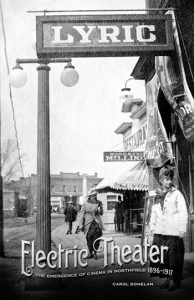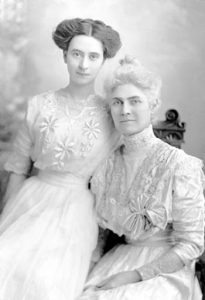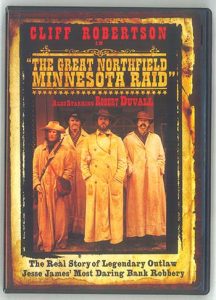The first “Jesse James Day” was held in Northfield on September 11, 1948, as part of a two-day Jaycee Fall Festival. The event was renamed “The Defeat of Jesse James Days” in 1959 to honor the role of the town on September 7, 1876, rather than seem to glorify the outlaw and his gang. In 1948 there was just one bank raid re-enactment, at 2 p.m., in front of the Jesse James Café (now the site of the Northfield Historical Society). Local re-enactors were joined by members of the South St. Paul “Hook ‘Em Cow” riders in the portrayal. (Chuck DeMann of Dundas, who portrayed local hero Henry Wheeler, continues as a member of the James-Younger Gang today.) A radio broadcast of the raid by KDHL of Faribault was transmitted to radio listeners and heard simultaneously by around 10,000 spectators through a public address system.
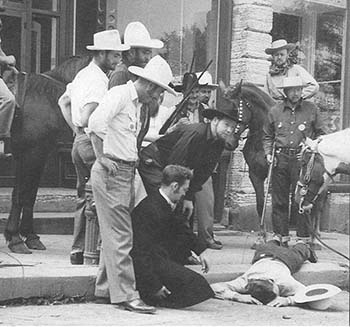 The parade which followed the raid “stole the show,” reported the Northfield News. “It was long, it was colorful, it was musical – it had everything. Cheer after cheer arose from the watchers as well-drilled marching units and spectacular floats swung along Division.” An American Legion band featured 11-year-old Gary Smith, the 1948 national juvenile baton champion.
The parade which followed the raid “stole the show,” reported the Northfield News. “It was long, it was colorful, it was musical – it had everything. Cheer after cheer arose from the watchers as well-drilled marching units and spectacular floats swung along Division.” An American Legion band featured 11-year-old Gary Smith, the 1948 national juvenile baton champion.
But there was one no-show. Jesse James, himself. The Northfield Jaycees extended an invitation to a 101-year-old man who claimed to be Jesse James to preside over the festivities. His guardian responded, “It may be possible for us to bring Jesse to your fair city, providing he’ll swear to act like a good boy this time.” This “Jesse James,” living under the name J. Frank Dalton in Oklahoma, swore that it was an imposter that had been killed in Missouri by gang member Bob Ford in 1882 and that he, Dalton, was really Jesse. The Jaycees balked at paying the $1,000 appearance fee requested and, as the Northfield Independent headline declared, “Jesse James’ Second Try at Holdup of Northfield Fails.” The last vehicle in the parade carried a coffin, said to be that of Jesse James.
The Northfield News wrote of the post-parade revelry: “And late into the night were heard the raucous calliope of the merry-go-round, the accordion of the street dance orchestra, the bingo barkers trying to sell their last card, and the assorted yips and yowls of a holiday crowd having the time of its life.”
The Twin Cities’ newspapers covered Jesse James Day and were much impressed by the number of bearded townspeople. A stock confinement had been set up for weeks for men who would not grow beards and the town had a great deal of fun with this aspect of the festivities.
Let’s let a young Northfield News columnist named Maggie Lee conclude this story, in words published Sept. 16, 1948: “Doggone! Now I’m having trouble figuring out who these guys are without their beards. Seems a little hard to settle back to earning a living after the week-end of whoop-te-doo.”
Rice County Fair
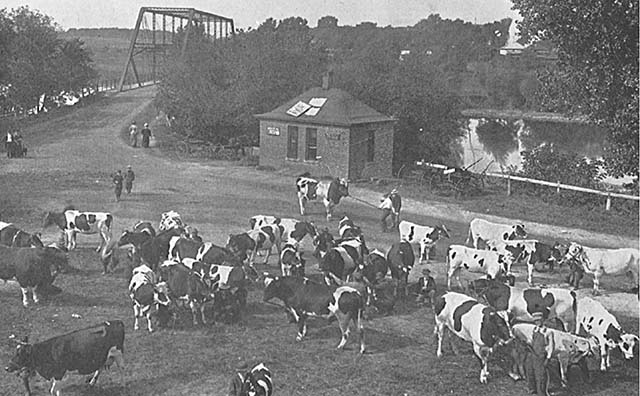
It was 1915. The town of Northfield was about to host its 49th Rice County Fair Sept. 23-25 and the Faribault Daily News was steamed.
“It is a pity that Northfield took over the title of ‘Rice county fair’ in the period when there was no fair at Faribault,” said the editorial. “That is a name which by every right belongs to the fair at the county seat. Northfield ought to return the name to this fair. Northfield never will be able to build up anything like the institution that will be developed here in the next half dozen years. In spite of the assumption of the name by the smaller city, the fair at the county seat will come more and more to be recognized as the real Rice county fair.”
In response, a writer at the Northfield Independent newspaper wrote “…it is not likely that Northfield will ever part with the title it has held for 49 years. And when it comes to an exhibit of the county’s real products it is safe to say that the honor and prestige of Rice county will be well taken care of in this city, in spite of its smaller population. In the line of sports and amusement attractions, however, we are will-ing to concede that Faribault is ahead of us.” A subsequent article in the Independent praised the quality of the Northfield fair’s entries of farm products, sheep, swine, poultry, draft horses, and particularly dairy cattle (outnumbering those at the state fair). You wondered where the slogan, “Cows, Colleges and Contentment,” originated?
For this 1915 fair, Northfield proudly made use of its new Armory for fair exhibits and a band concert, though the building was not quite finished. (The Independent said this use showed that the Armory “will not be a mere ornament and loafing place as some people contended not very long ago.”) A W.C.T.U. booth dispensed temperance literature with posters illustrating the evils of liquor. The Y.M.C.A. building (now the home of the Northfield Arts Guild) was pressed into use for sewing, art and culinary exhibits, though the building had been closed since 1900.
Acrobats, jugglers, a trained dog and monkey show, and a street parade were among the amusements offered. The parade featured floats, decorated autos and bands, and concluded with three fire department wagons pulled by galloping horses, which reminded spectators of the old Roman chariot races, according to the Independent. This fair was the first to charge admission and, despite some inclement weather, expenses were covered when 902 season tickets and 1,997 daily tickets were sold at 50 cents and 25 cents, respectively.
The 1915 fair was marred only by “greencap freshmen” who rushed up and down the streets, trying to break into moving picture shows and crowding onto the merry-go-round with-out buying tickets. Whether these “merrymakers” were students at St. Olaf or Carleton was not mentioned.
The Rice County Fair continued to be held in Northfield until Faribault took over the name for the fair of Aug. 13-16, 1938. A “Northfield Day” was held on the Monday of the fair, when pledges of cooperation were given by Northfield for this “consolidation,” thus ending a 71-year tradition of “the smaller city.”
Information for this story was found in the archives of the Northfield Historical Society.


